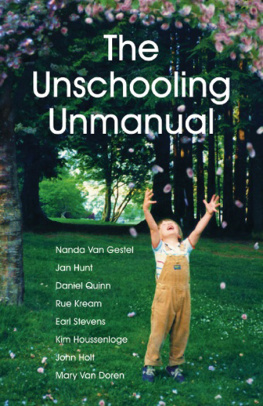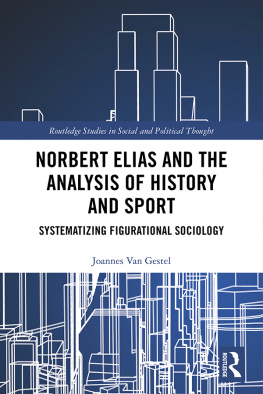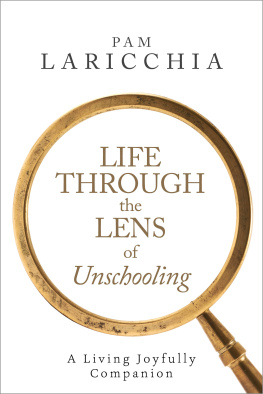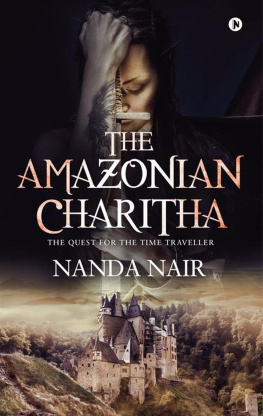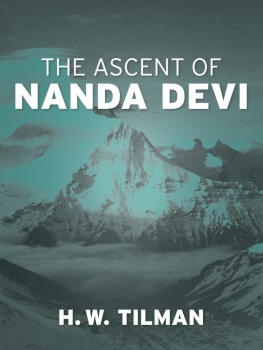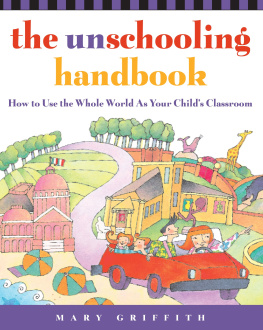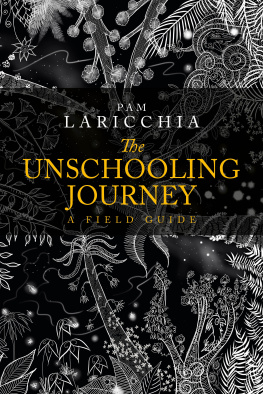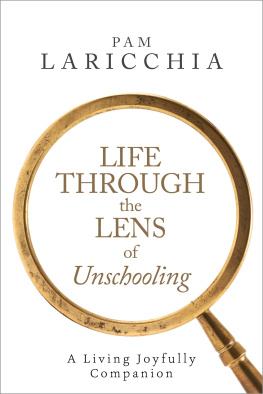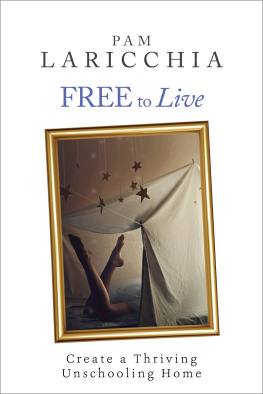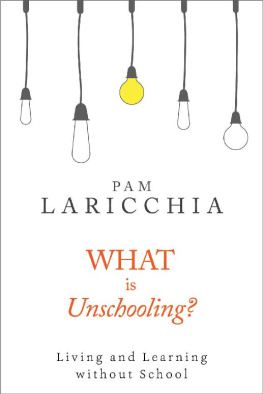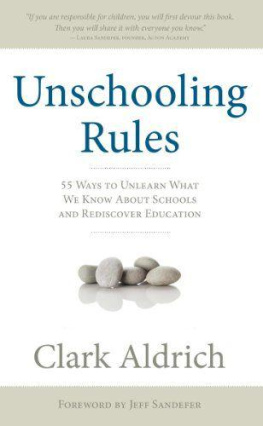The
Unschooling
Unmanual
Nanda Van Gestel
Jan Hunt
Daniel Quinn
Rue Kream
Earl Stevens
Kim Houssenloge
John Holt
Mary Van Doren
Edited by Jan and Jason Hunt
Book design by Jason Hunt
The Natural Child Project
naturalchild.org
Library and Archives Canada Cataloguing in Publication
The unschooling unmanual/Nanda van Gestel [et al.] ; edited by Jan and Jason Hunt ; book design by Jason Hunt.
Includes bibliographical references.
ISBN 978-0-9685754-5-1 (bound)
Ebook ISBN 978-0-9685754-8-2
1. Home schooling. 2. Non-formal education. 3. EducationParent participation. I. Van Gestel, Nanda, 1964- II. Hunt, Jan, 1942- III. Hunt, Jason, 1981-.
LC40.U58 2008 371.042 C2007-907656-4
First edition. 2008 The Natural Child Project (naturalchild.org). All rights reserved. For reprint permission, orders, and other information, visit naturalchild.org/contact.
Front and back cover design and book layout by Jason Hunt. Cover photo of Jason, age 4, by Jan Hunt. Back cover photo of Koen and Jochem by Nanda Van Gestel.
Schooling: The Hidden Agenda was presented at the Houston Unschoolers Group Family Learning Conference, October 2000. 2000 Daniel Quinn.
Jan Hunts articles The Natural Love of Learning and How Do We Know Theyre Learning? are adapted from The Natural Child: Parenting From the Heart. 2001.
Rue Kreams articles Why Choose Unschooling? and What About College? are reprinted from her book Parenting a Free Child: An Unschooled Life. 2005.
Every Waking Hour is excerpted from Learning All the Time by John Holt. 2005. Reprinted by arrangement with Basic Books, a member of the Perseus Books Group (perseusbooks.com). All rights reserved.
Marys Memoirs by Mary Van Doren originally appeared in Growing Without Schooling in the 1980s. Reprinted with permission of Holt Associates/Growing Without Schooling (holtgws.com).
To order The Unschooling Unmanual directly from the publishers, and for more information about this book, visit naturalchild.org/unmanual.
Dedicated to John Caldwell Holt
1923-1985
Little children love the world. That is why they are so good at learning about it. For it is love, not tricks and techniques of thought, that lies at the heart of all true learning. Can we bring ourselves to let children learn and grow through that love?
John Holt
Why Choose Unschooling?
by Rue Kream
A persons freedom of learning is part of his freedom of thought, even more basic than his freedom of speech.
John Holt
Why did you choose unschooling rather than some other form of homeschooling?
I always knew that the way everybody lived didnt feel right to me. I used to imagine that, when I grew up, I would live on an island with my family. From a very young age I struggled to understand what life really meant. As I grew, I came up with some answers. Life for me is truly feeling the earth underneath me and seeing the things around me. It is enjoying every moment with the people I love. It is making another person smile. It is thinking and dreaming, feeling pain and feeling joy.
When Dagny was a baby, I started to ask myself new questions. Does it matter if we know our multiplication tables? Is accumulation of knowledge the goal of life? Should there be a goal of life? Why should we spend her childhood apart from each other when we both want so much to be together? Can we step off the well-worn path and find our own way?
When I learned that unschooling was a possibility, I was thrilled that we could continue to live as we had been since Dagny was born. I found the answers to my questions, which in reality I had known all along. Children belong with their families. Nothing is more important than living in connection with the ones you love and sharing lifes experiences. We cant help but learn as we live full and interesting lives together. When we rejected the kind of life that comes with a road map, we were able to question what it was we wanted from our lives, and to determine what we do not want. We want joy. We want to know that we lived consciously and in the moment. We do not want to mold our children. We want them to have the freedom to choose their lives. We do not want to ever feel that we wasted time we could have spent together.

Children belong with their families.

Our major reasons for unschooling have nothing to do with academics, but of course there are reasons we choose not to teach our children. We believe that children (humans) seek out knowledge in the same way they seek out fun or food, and we believe that adults can do a lot to interfere with that desire to learn. We dont believe that repetition is necessary or that there is a list of things that every person needs to know. We believe that turning the relationship of parent and child into a relationship between teacher and student is detrimental. We want our children to own their learning and to learn for their own reasons, not to please a teacher.
Jon and I have determined what it is we live by, what matters, and what does not. It has evolved and will continue to evolve as we face new challenges and joys in our lives. We want to choose the lives we lead, and we want our children to have the opportunity to do the same.
Ultimately Id say that the reason we choose to unschool is because we want our children to be truly free.

2005 Rue Kream
School always appeared to me like a prison, and I could never make up my mind to stay there, when the sunshine was inviting, the sea smooth, and when it was such a joy to run about in the free air, or to paddle around in the water.
Claude Monet
The Natural Love of Learning
by Jan Hunt
T he main element in successful unschooling is trust. We trust our children to know when they are ready to learn and what they are interested in learning. We trust them to know how to go about learning. Parents commonly take this view of learning during the childs first two years, when he is learning to stand, walk, talk, and to perform many other important and difficult things, with little help from anyone. No one worries that a baby will be too lazy, uncooperative, or unmotivated to learn these things; it is simply assumed that every baby is born wanting to learn the things he needs to know in order to understand and to participate in the world around him. These one-and two-year-old experts teach us several principles of learning:
Children are naturally curious and have a built-in desire to learn first-hand about the world around them.
John Holt, in his book How Children Learn, describes the natural learning style of young children:
The child is curious. He wants to make sense out of things, find out how things work, gain competence and control over himself and his environment, and do what he can see other people doing. He is open, perceptive, and experimental. He does not merely observe the world around him. He does not shut himself off from the strange, complicated world around him, but tastes it, touches it, hefts it, bends it, breaks it. To find out how reality works, he works on it. He is bold. He is not afraid of making mistakes. And he is patient. He can tolerate an extraordinary amount of uncertainty, confusion, ignorance, and suspense. School is not a place that gives much time, or opportunity, or reward, for this kind of thinking and learning.
Next page
